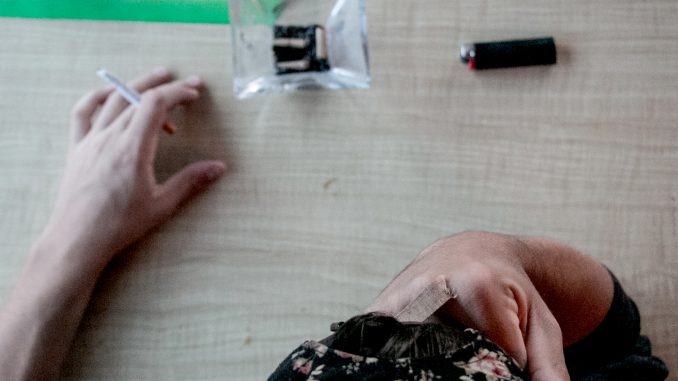
Temple has a history of being progressive in its policies against cigarette smoking.
In 1990 under President Peter Liacouras, Temple was one of the first campuses in the nation to ban smoking inside university buildings, as well as banning advertising for tobacco products in campus publications. In 2007, all the cigarette ashtrays were removed in an effort to decrease the smoking population on campus.
Michael Horwath, however, director of student affairs of Temple Student Government, said this only led to an overwhelming number of cigarette butts on the ground and the ban was later revoked.
Other colleges like Ohio State University have created tobacco-free campus policies. A policy of this sort is not currently on the table for Temple—and Ohio State has had a hard time reducing smoking on its campus, Horwath said.
“In Ohio State, since it’s not an actual law and just a policy, police can’t actually enforce it,” Horwath said. “It’s more student influence on whether or not people are smoking. There is increased littering on their campus.”
The health risks of cigarettes like lung disease, strokes and heart attacks are drilled into kids through programs like Breathe PA starting at a young age. However, many freshmen pick up smoking soon after starting college.
Centers for Disease Control and Prevention cites that 18.7 percent of adults between the ages of 18-24 smoke, a number the Temple Wellness Center estimates to reflect the percentage of smokers on Temple’s campus as well.
“My major is really stressful … [smoking] is a distraction,” said Tori Cookson, a freshman nursing major who started smoking shortly after starting college. “I don’t think I’m addicted, it’s just a mental thing to subconsciously take away stress.”
Senior criminal justice major Sam Mckee agreed with Cookson, adding smoking is a strong social activity.
“I was playing in bands and it’s the reverse end of society, so I kind of did it for the social aspect,” Cookson said. “And I’ve found it to be a good stress reliever.”
Recognizing the potential gains from smoking, Philadelphia’s Department of Revenue approved a $2 cigarette tax enacted Oct. 1 2014. This extra cigarette revenue is goes toward the Philadelphia school system.
The tax has also decreased the number of packs bought per month. The revenue cigarettes brought in went from $8.1 million before the tax to $5.7 million in August of this year.
Horwath said new walkways can serve as a solution to cleaning up cigarette butts, one of the big issues associated with smoking on Main Campus.
“Cigarette butts land in between brickwork,” he said. “If you look in front of [Alter and Speakman halls], the design of the new walkways makes it easier for facilities to clean up those walk spaces.”
Ben Palestino, executive communications director of Temple Student Government, said one of the ways to combat this litter is through student response on social media. TSG has a Snapchat students can send pictures to so the problem can be addressed, he said.
Temple’s Wellness Center has a variety of alcohol and drug cessation programs, but the only cigarette cessation program to be found is not located on Temple’s campus.
Senior public health major Molly Driscoll, assistant program coordinator for Mental Health, Alcohol and other Drugs and Interpersonal Violence with the Wellness Resource Center, is interested in starting support groups.
“Most people who are going to smoke know the risks of smoking by this age,” Driscoll said. “Cessation is much more of an issue than prevention.”
One of the programs Driscoll said she has considered is “collegiate smoke out” days. These days would be designated to help smokers quit smoking and see the immediate benefits of doing so.
While Temple may not become a smoke-free campus, steps could be taken to help reduce the practice in certain areas, Horwath said.
“What I envision, and what I see TSG working towards is creating smoke-free zones,” he said. “So areas like the upper-terrace level of Gladfelter, those are areas we can slowly make smoke-free.”
Lila Gordon can be reached at lila.gordon@temple.edu.



Be the first to comment